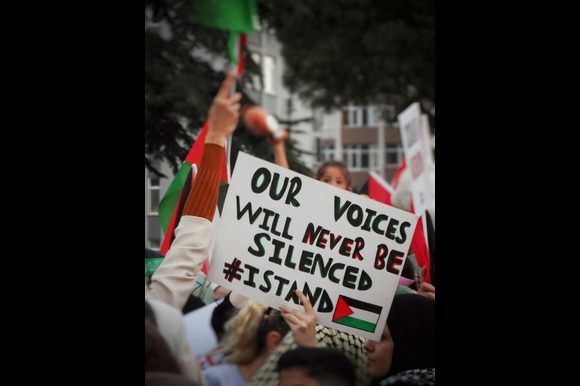Six out of eight international activists detained by Israeli authorities after their boat was intercepted en route to Gaza have now been deported, Israel’s foreign ministry confirmed on Thursday.
The activists were aboard the Madleen, part of the Freedom Flotilla Coalition’s symbolic mission to challenge Israel’s naval blockade on Gaza and deliver limited humanitarian aid. The vessel was stopped in international waters on Monday, around 185km (115 miles) off the Gazan coast. The interception has sparked condemnation from rights groups and renewed debate over Israel’s maritime policies.
Israeli human rights organisation Adalah reported that the six activists were transferred to Ben Gurion Airport following over 72 hours in custody. They also stated that two other detainees remained in Givon prison and are expected to be deported on Friday.
Among those deported Thursday was French-Palestinian and European Parliament member Rima Hassan. The Israeli foreign ministry, in a statement on X (formerly Twitter), said: “Six more passengers from the ‘selfie yacht,’ including Rima Hassan, are on their way out of Israel. Bye-bye—and don’t forget to take a selfie before you leave.” The ministry also released images of the activists boarding and seated on an aircraft.
On her X account, Hassan confirmed her release and invited supporters to gather at Place de la République in Paris at 21:00 (20:00 BST).
Adalah identified the other five deportees as Mark van Rennes (Netherlands), Suayb Ordu (Turkey), Yasemin Acar (Germany), Thiago Avila (Brazil), and Reva Viard (France). The two remaining detainees—Pascal Maurieras and Yanis Mhamdi, both French—are expected to be deported Friday.
Adalah has condemned the activists’ detention and deportation, describing their treatment in custody as harsh. “Volunteers were subjected to mistreatment, punitive measures, and aggressive treatment, and two were held in solitary confinement,” the group said in a statement.
Calling the actions unlawful, Adalah demanded the immediate release and safe return of all eight activists. “Their continued detention and forced deportation are part of Israel’s ongoing violations of international law,” the group stated.
Israel’s foreign ministry responded that activists who declined to sign deportation documents would face legal procedures for removal under Israeli law.
Initially, 12 people were aboard the Madleen when intercepted. Four of them, including Swedish climate activist Greta Thunberg and two French nationals, agreed to immediate deportation. Thunberg later accused Israel of kidnapping the activists, stating they were in international waters when detained.
Israeli officials have dismissed the flotilla as a publicity stunt, branding the vessel a “selfie yacht” carrying less aid than a single truckload. They added that the aid—baby formula and medicine—would be redirected through “real humanitarian channels.”
Meanwhile, other pro-Palestinian initiatives have faced similar obstacles. The Global March to Gaza, which planned to mobilise from Egypt to the southern Gaza border, reported that about 170 activists were facing delays and possible deportation at Cairo airport.
The group said legal teams were intervening and insisted participants had complied with all Egyptian travel requirements. Egypt’s interior ministry has yet to comment, though its foreign ministry reiterated Wednesday that prior state approval is needed for travel to the border region.
The march aims to proceed from El Arish in northern Egypt to the Rafah border crossing with Gaza by Sunday. Concurrently, a convoy of roughly 1,500 activists from Tunisia and Libya also aims to join the Gaza-bound demonstration.
Israel and Egypt have enforced a blockade on Gaza since 2007, when Hamas took control of the territory. Israeli Defence Minister Yoav Gallant has urged Egypt to block what he described as “jihadist protesters” from reaching the border.
Israel cut off all aid and commercial supplies to Gaza on 2 March, resuming military operations two weeks later and ending a temporary ceasefire with Hamas. The move was meant to pressure Hamas to release hostages, but has contributed to dire shortages in food and medicine, prompting UN warnings of “catastrophic hunger” for Gaza’s 2.1 million residents.
Three weeks ago, Israel launched a broader offensive aimed at regaining control of all areas of Gaza. It has since allowed in limited food supplies but redirected distribution through the Gaza Humanitarian Foundation, a mechanism supported by Israel and the US. However, the UN and other aid agencies refuse to participate, citing violations of neutrality, impartiality, and independence.
The Gaza conflict, now in its 20th month, began after Hamas’ cross-border attacks on 7 October 2023, which killed around 1,200 people and led to the capture of 251 hostages. Since then, at least 55,207 people have died in Gaza, according to the Hamas-run health ministry.






